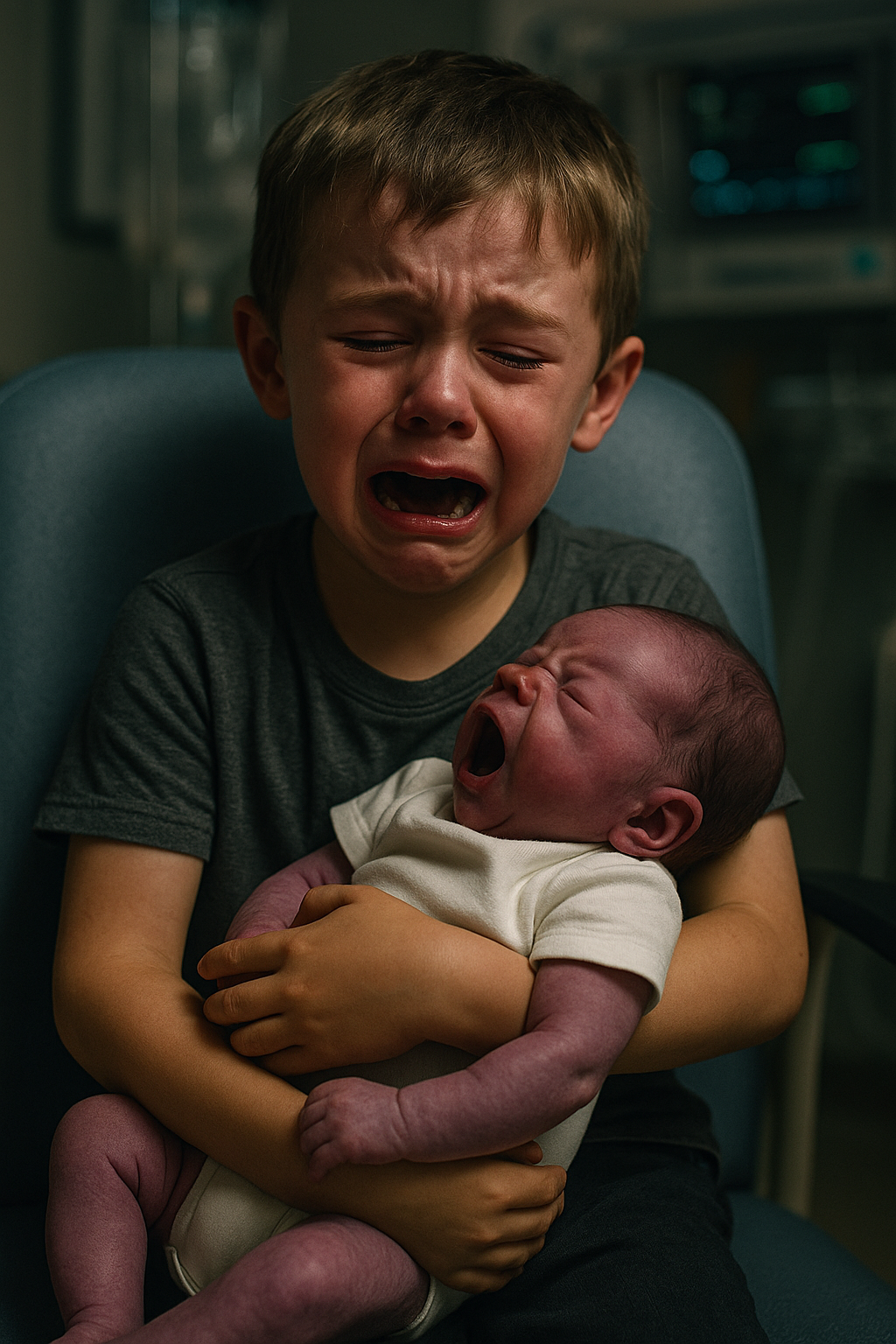The delivery room was unbearably still. For half an hour, nurses had moved in and out with hushed urgency, their whispered updates carrying more dread than hope. Emily Turner lay on the bed, drenched in sweat, eyes hollow from exhaustion and terror. At her side, her husband Michael held her trembling hand, his own knuckles pale from the grip.
Moments earlier, the words had fallen like a death sentence: their baby boy was stillborn. Lifeless. No heartbeat. Gone before he had begun.
A nurse wrapped the tiny body in a pale blue blanket and hesitated. Emily’s tears fell unchecked as she whispered, “Let Jacob hold him. Let him say goodbye.”
Michael almost protested—was it too cruel for their seven-year-old son to face this?—but he couldn’t bring himself to deny her. So they placed the bundle into Jacob’s small arms.
The boy stared at the pale face, lips bluish, skin cold to the touch. His arms shook as he whispered, “Hi, Ben. I’m your big brother.”
For a moment, nothing. The room was suffocating, thick with grief. Then, a sound split the silence.
A cry.

At first, they thought it was Jacob, breaking down in sobs. But no—it came from the bundle in his arms.
Benjamin Turner gasped, his chest rising, his voice raw and piercing.
The room erupted into chaos. Nurses shouted orders, hands trembling as they rushed forward. Emily screamed, a sound caught between horror and joy. Michael staggered against the wall, his vision swimming. Suction tubes, oxygen masks, warming lamps—the room became a blur of motion.
On the monitor, faint and erratic, appeared what they had been told did not exist: a heartbeat.
Emily clutched Michael’s arm, sobbing, “He’s alive. Mike, he’s alive.”
But the battle had only begun. Benjamin was dangerously fragile, his oxygen levels plummeting, his body wracked with the desperate effort to live. The NICU team wheeled him away beneath a nest of wires and tubes, Emily’s cries echoing after him.
That night dragged into eternity. Emily lay sleepless, replaying his cry over and over in her mind, while Michael sat beside her scrolling through medical articles about stillbirth reversals and oxygen deprivation. The odds were merciless.
At 3 a.m., Dr. Alvarez, the neonatologist, sat heavily by their bed. “Your son is stable for now. He’s breathing with support. But the next 48 hours are critical. We can’t predict the damage oxygen loss may have caused.”
Emily clung to the one word that mattered: alive.
The days blurred together. Machines beeped. Doctors murmured. Emily pressed her hands to the incubator, whispering lullabies through the glass. Jacob drew crayon pictures for his brother, taping them to the NICU walls.
Michael wrestled with guilt. He replayed every decision, every hesitation, convinced he had failed them.
After a week, Benjamin was weaned off oxygen support. His chest rose and fell weakly but on its own. Nurses called him “the fighter.” Yet scans showed troubling signs—possible brain injury from lack of oxygen.
Emily refused to let statistics define her son. “He wasn’t supposed to breathe at all,” she told Michael. “So don’t tell me what he can’t do.”

Six months later, their home bore the scars of struggle and the light of survival. The nursery that once stood like a tomb now rang with laughter. Benjamin was smaller than other babies, but his raspy giggle filled the room like sunlight breaking through storm clouds.
Emily balanced online teaching with therapy sessions, her resilience astonishing even her closest friends. Michael’s construction business faltered under medical bills, but each time he held Benjamin against his chest, the steady heartbeat made every sacrifice bearable.
Jacob, now eight, became his brother’s fierce guardian. He wheeled the stroller proudly through the park, declaring to anyone who would listen: “This is my little brother. He cried when nobody thought he could.”
One evening, the family sat on their porch as fireflies flickered around them. Jacob chased them across the lawn while Emily cradled Benjamin, his small fingers clutching her blouse.
Michael whispered, “Do you ever wonder why he cried then? Why in Jacob’s arms?”
Emily pressed her cheek against Benjamin’s head, smiling faintly. “Maybe he just needed to hear his brother’s voice first.”
The road ahead would be uncertain—therapies, setbacks, endless unknowns. But they had stopped asking for guarantees.
For now, they had this: a porch glowing in the sunset, a fragile laugh that carried defiance, and the memory of a cry that shattered silence, rewrote fate, and bound them together forever.